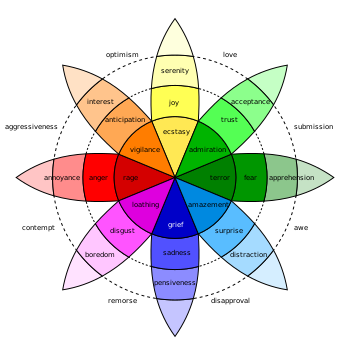 |
| English: Robert Plutchik's Wheel of Emotions (Photo credit: Wikipedia) |
Certain words/phrases can induce fairly specific responses in readers. As
writers, we all know this, but do we use the power of emotion in our work?
I set out here to suggest a few alternatives some weeks ago. Since then,
several barriers have prevented me making regular posts. However, I’m now able
to resume, so here goes.
In this series I’ll look at the difference between those words that seem
intellectual as opposed to those that invoke a more emotional response. How you
use them is obviously up to you. The point is that the alternatives have the
same, or very similar, meanings, but their effect upon the reader can be
markedly different. I’ve made some suggestions here, but I’m sure you can think
of others.
Intellectual: Additionally
Emotional: there’s more
Cameron gave several reasons for the loathing he experienced from the
Scots; additionally, he included the north of England in his pretence to give a
damn about the welfare of the people.
Gordon listed the things he most liked about Sarah. He paused when he saw
she was less than enthusiastic. ‘And, there’s more.’ He said, adding those
qualities he hoped she might treasure.
Intellectual: Concerning
Emotional: About
‘I have to give a talk to my fellow politicians concerning their
inability to understand the concept of honesty.’ Said the MP.
‘I’ve got to talk to those prats in Parliament about their total lack of
honesty.’ Said the trade union leader.
Intellectual: Perspiration
Emotional: Sweat
There is, in the perspiration of extended effort, the joy of experiencing
the reward for hard work.
‘Good, honest sweat never hurt me, mate.’
No comments:
Post a Comment